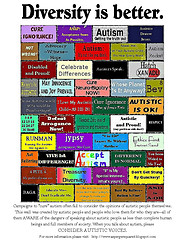Clueless
We sit at the table on the last spot of homework, a cross-word for the first grader. Rather than written clues, it has pictures. The last slot is blank. The icon depicts a bowl filled with some kind of liquid and a spoon. It begins with s and ends in p. It is a foodstuff that junior has never consumed. [nor likely to in the near future] I think that he is being awkward.
You would think after all this time, I would be more 'with it,' in the autism department. My learning curve in other areas of my life, is advancing, as evidenced by my ability to understand the humor in "my pal's posting." This is fun, this is progress. In theory it is evidence that despite my advancing years, you can teach an old dog new tricks. At the same time, when it comes to autism, I always feel that I am several step, if not leagues, behind.
His aversion to food ["neophobia"] often leads to difficulties. A long time back, when he was first evaluated, whenever a food item came up in the pictures, he refused to answer, would not say the word aloud. Due to his tactile defensiveness, he also refused to point to the correct answer because then his fingertip would come into contact with paper. It took a wee while to get over that particularly difficulty, until we rephrased the question from ‘which one of these do you eat?’ to ‘which one of these would your sister eat?’
I think we are experiencing the same issue with the homework.
For myself, following jaw surgery, I am so heartily sick of Cock-a-Leekie, Mullagatawny, split pea, puree etc., that I find my sense of humor is under strain.
“Lets think about it shall we? What did I have earlier today for a snack?”
“Er, you are having dah chocolate milk,” he drools in a breathy tone.
“Yes, but not that snack, that is a snack that you drink, this is a snack that you eat.”
“Oh.”
“Can you think of anything else perhaps? What did I have later, the thing that smelt bad?”
“Everyfink dat you eat is smelling bad except dah chocolate milk!” I seem to have mislaid my ‘thinking out of the box’ skills, and a small sigh escapes.
“How about I show you a tin of it?”
“You have some in a tin?”
“I do. I have lots of tins of it!” I nip out to the garage and return with an armful of tins to park in front of him on the table. “There you go. What are these?”
“Dey are cans. Cans is beginning wiv dah ‘c’ and is ending in dah ‘s’. Dat is bad. Dat is not dah right answer. I am a bad student. Mrs. Ko will be giving me dah bad grades because my brain is too tiny today!” He weeps and his head drops to his arms on the table. It’s frightening how quickly he can spiral down into despair. They are real tears.
“Not at all, you are very clever and a great student. Now how about we read the words on the can? Look!” He raises his heavy head and dewy eye lashes, "it is saying 'soup,' I already am knowing dat but it dah wrong answer.”
“No! It’s not, it’s the right answer, you knew it all the time, how clever you are.”
“What! What? What! ‘Soup’ is being dah right answer?”
“Yes dear! You’re right!”
He spits and stutters, bristles and sputters, “but, but, but ….you said it wuz for dah eating kind of food! You are dah idiot! Soup is dah liquid, so you are drinking it not eating!”




































